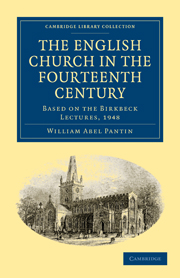Book contents
- Frontmatter
- Contents
- Preface
- List of Abbreviations
- I INTRODUCTION: THE LEGACY OF THE THIRTEENTH CENTURY
- PART I CHURCH AND STATE
- PART II INTELLECTUAL LIFE AND CONTROVERSY
- VI SCHOLASTIC INSTITUTIONS AND THE GEOGRAPHY OF LEARNING
- VII TOPICS OF CONTROVERSY
- VIII PERSONALITIES
- PART III RELIGIOUS LITERATURE
- Appendix I The Latin text of passages quoted from manuscript sources
- Appendix II Two collections of didactic treatises
- Index
VIII - PERSONALITIES
Published online by Cambridge University Press: 10 November 2010
- Frontmatter
- Contents
- Preface
- List of Abbreviations
- I INTRODUCTION: THE LEGACY OF THE THIRTEENTH CENTURY
- PART I CHURCH AND STATE
- PART II INTELLECTUAL LIFE AND CONTROVERSY
- VI SCHOLASTIC INSTITUTIONS AND THE GEOGRAPHY OF LEARNING
- VII TOPICS OF CONTROVERSY
- VIII PERSONALITIES
- PART III RELIGIOUS LITERATURE
- Appendix I The Latin text of passages quoted from manuscript sources
- Appendix II Two collections of didactic treatises
- Index
Summary
In considering the personalities who played a part in fourteenth-century intellectual life and controversy, it is only possible here to select a few individuals or groups. In the first place there is a very remarkable series of writers who were Fellows of Merton College, Oxford, in the first half of the fourteenth century.
During the first quarter of the century, the series starts with Walter Burley (c. 1305), the earliest and one of the most influential of the group; he was a logician and commentator on Aristotle with a European fame, being later known as Doctor planus et perspicuus, and had taught at Oxford, Paris and Toulouse. Such an international scholastic career, which had once been common enough, was now beginning to be uncommon, at least among seculars. A slightly junior contemporary was John Mauduit (c. 1309–19), an astronomer.
During the second quarter of the century, we find at Merton the great Thomas Bradwardine (c. 1323–35), the Doctor profundus, remembered chiefly as a theologian for his work De causa Dei contra Pelagianos, but also a writer on mathematics and dynamics; Richard Camsale (c. 1305–26), a logician; John Dumbleton (c. 1338–47), also a logician; Thomas Buckingham (c. 1324–40), a theologian; William Heytesbury (c. 1330–46), a logician and physicist; Simon Bredon (c. 1330–41), an astronomer; John Ashenden (c. 1336–53), also an astronomer.
- Type
- Chapter
- Information
- The English Church in the Fourteenth CenturyBased on the Birkbeck Lectures, 1948, pp. 136 - 186Publisher: Cambridge University PressPrint publication year: 2010First published in: 1955

